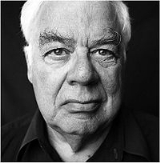
, Kenan Professor of Humanities at the University of Virginia
, and Professor of Comparative Literature
at Stanford University
. His complex intellectual background gave him a comprehensive and nuanced understanding of the analytic
tradition in philosophy, which he would later famously reject in favor of his own brand of pragmatism
.
The philosophical program he developed included a rejection of a representationalist account of knowledge, a concept he referred to as a "mirror of nature," which he saw as a holdover from Platonism
and pervasive throughout the history of philosophy.
My principal motive is the belief that we can still make admirable sense of our lives even if we cease to have ... "an ambition of transcendence."![]()
Philosophy makes progress not by becoming more rigorous but by becoming more imaginative.![]()
Truthfulness under oath is, by now, a matter of our civic religion, our relation to our fellow citizens rather than our relation to a nonhuman power.![]()
If I had to lay bets, my bet would be that everything is going to go to hell, but, you know, what else have we got except hope?![]()
Philosophers get attention only when they appear to be doing something sinister--corrupting the youth, undermining the foundations of civilization, sneering at all we hold dear. The rest of the time everybody assumes that they are hard at work somewhere down in the sub-basement, keeping those foundations in good repair. Nobody much cares what brand of intellectual duct tape is being used.![]()

